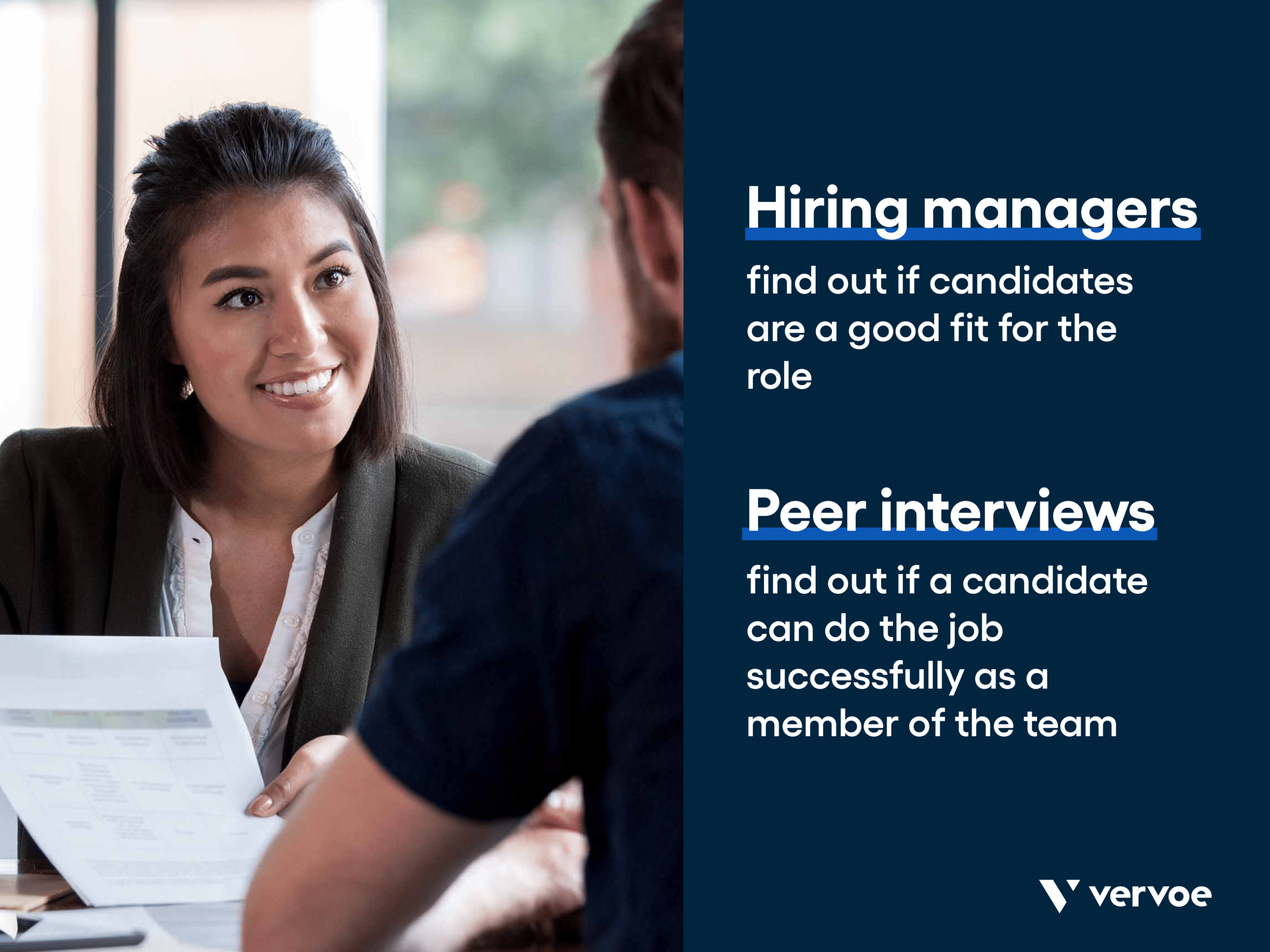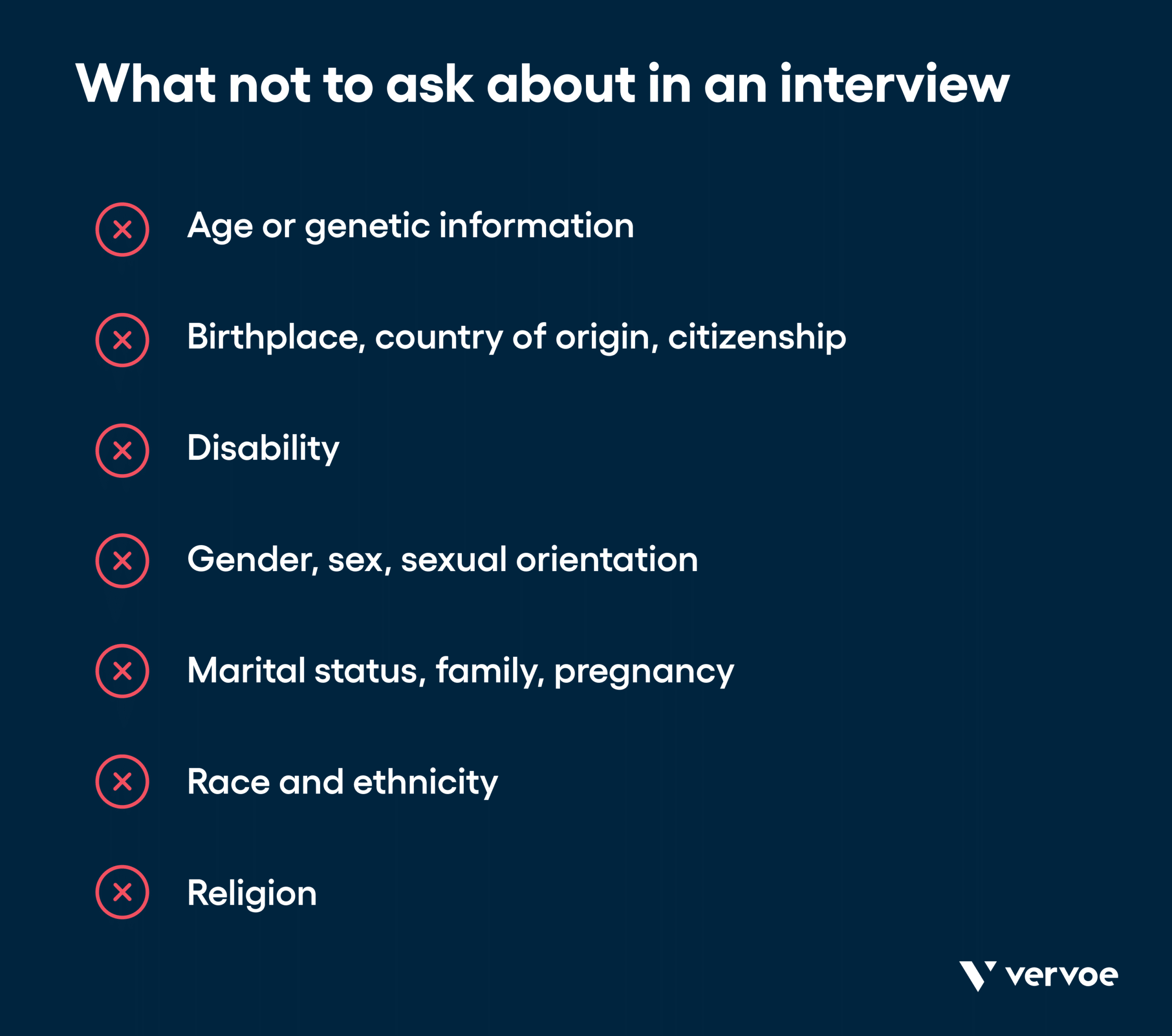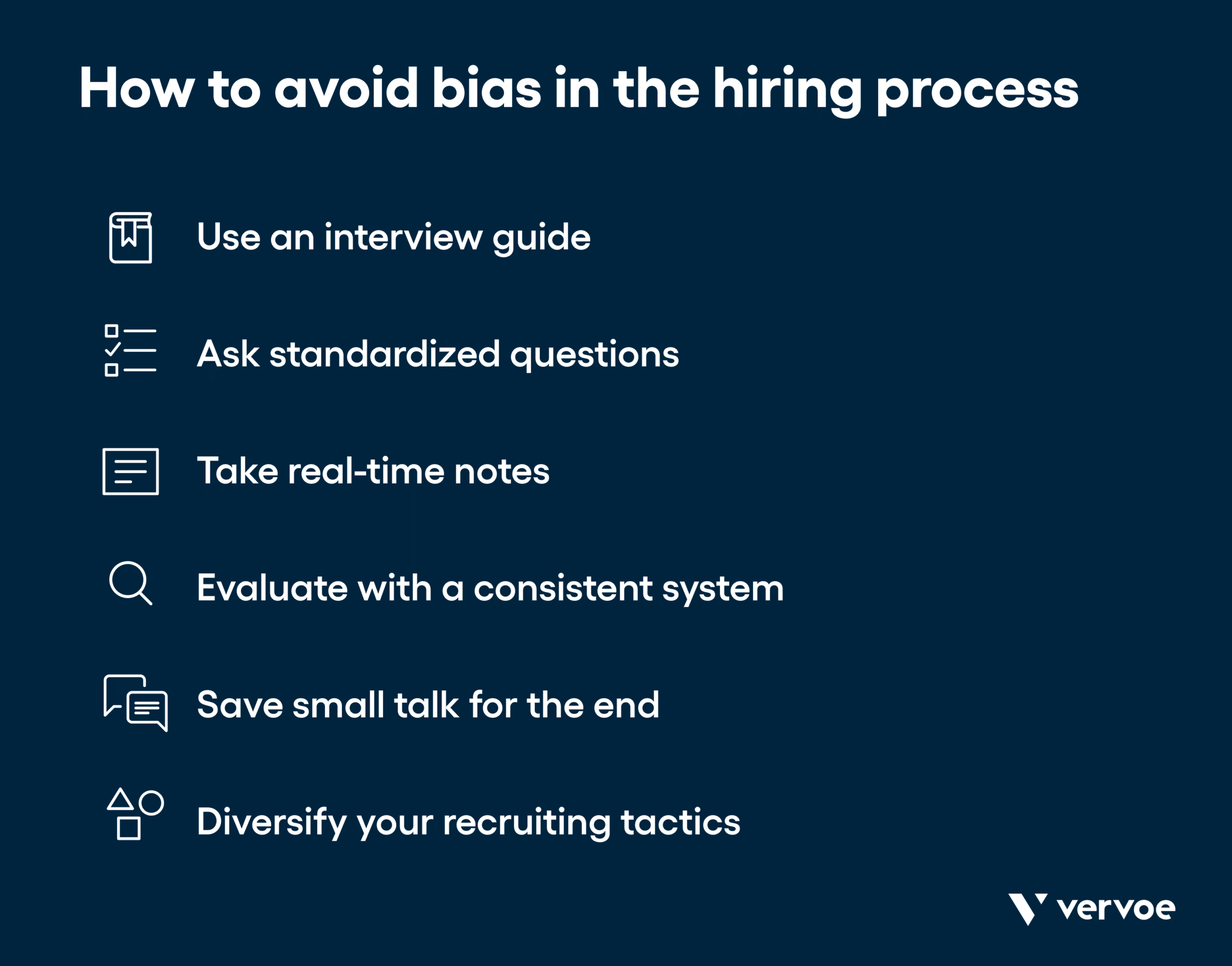When it comes down to it, hiring managers only know so much about their open roles. They know the requirements in terms of skills and qualifications, but unless they’ve filled the role themselves before, it’s difficult to comprehend some of the nuances.
The solution? Reinforcements. Peer interviewing incorporates the opinions of those who work closely with the open role into the hiring process, filling the gaps in knowledge hiring managers may have, to make better informed hiring decisions.
What is a peer interview?
A peer interview is an interview technique where candidates meet with their potential colleagues, rather than with a hiring manager or recruiter. These interviews can be conducted by either a supervisor or an employee who previously held the position.
The peer holding the interview will pass their thoughts on to the hiring manager, who will communicate with the candidate from thereon in.
Instead of learning whether or not a candidate can do the job, the hiring manager will learn how well the candidate will perform within the team.
Advantages of peer interviews
A peer interview is beneficial to the company, its employees, and the candidates. Candidates feel more comfortable getting to know the company in peer interviews, and employees get to know which candidates will fit in well with their team.
Hiring the best candidate for the role – not to be confused with the most qualified one for the role – will decrease employee turnover in the long run.
Here’s a rundown of all the reasons you should try a peer interview in your next hiring process:
It helps hire candidates who fit the culture
They’re not trying to impress peers as much because they know who’s making the ultimate hiring decision, allowing them to show their true colors.
When candidates interview with hiring managers, they know they’re speaking to the ultimate decision-maker. This feeling can be intense. Most candidates put on a show, calculating every move they make.
A peer interview relieves some of that pressure, helping candidates feel comfortable showing their authentic selves. As they chat, they’ll likely reveal their true colors. And since they’re chatting with their potential peers during this metamorphosis, your employees can judge how well they’ll fit into the company culture as a new hire.
It’s in the best interests of organizations to prioritize this, as good company culture can increase revenue by four times.
Candidates get a feel for the company
While traditional interviews do provide candidates the opportunity to ask questions about the role, most candidates will try to ask the most impressive questions, rather than exploring their actual curiosities.
In a peer interview, candidates typically feel more comfortable asking questions that will truly help them get a feel for the company – and help them decide if they’re a good fit.
Plus, peer interviews give candidates the opportunity to receive answers and feedback from multiple team members, rather than one hiring manager or boss who only has a bird’s-eye-view of the team’s day-to-day. Because your employees are elbows-deep in work every day, they’ll be able to answer questions about specific tasks and expectations that a boss might not even know they have.
Peers know what’s expected of them
Employees who’ve worked closely with (or even in) the role you’re hiring for are intimately familiar with the role’s requirements and expectations.
They know the soft skills and work habits necessary for success in the job, which gives them an intuitive understanding of which candidates will be successful in the role.
Hiring managers make decisions based on factors like hard skills, past experience, and salary expectations. These are all important questions to ask, and should be asked in the interview with the hiring manager. But peer interviews can assess a different set of competencies altogether.
Hiring managers find out if candidates are a good fit for the role. Peer interviews find out if a candidate can do the job successfully as a member of the team.
Gets your team invested in the hiring process
Involving your team in the hiring process is a great way to boost employee engagement. It lets your employees know you value their professional opinions and want them to have teammates that complement their dynamic and improve the company’s overall success.
5 benefits of employee engagement
- 71% of executives say employee engagement is crucial to their company’s success
- 69% of employees say they’d work harder if they were better appreciated
- Low employee engagement can cost companies $450-$500 billion per year
- Companies with highly engaged employees are 21% more profitable
- 37% of employees consider recognition the most important thing companies can do to help them be more successful
When your employees already support the new hire they helped choose, they’re extra-motivated to help their new teammate adjust and succeed.
Peer interview disadvantages
Every strategy has its pros and cons. Here are some of the disadvantages of peer interviews you should be aware of before you jump in:
Peers must be trained to interview
You can’t just send your employees into a conference room without knowing what to expect in a peer interview. Interviews require structure. Left unchecked, peer interviews could go on forever. Prior to holding peer interviews, it’s important to brief your employees on a timeline and structure that will set them up for success.
10 questions to ask in a peer interview
- How would you approach a conflict with a coworker?
- What are you looking for in a coworker?
- How would you describe the ideal employee?
- How would you describe your ability to work in a team environment?
- What’s your typical role within a team environment? Lead, support, mediate, or challenge?
- What does it take to communicate effectively within a team?
- What’s your take on our workplace culture so far? How would you uphold our company values as a new hire?
- How would you respond to a coworker requesting your assistance at a time when you’re busy?
- When facing significant change in the workplace, how would you react?
- What would you do if you noticed a coworker in distress?
Additionally, there’s always the risk your employees might ask unprofessional (or even illegal) questions. Make sure to identify what’s appropriate and what is off-limits.
What not to ask about in an interview
- Age or genetic information
- Birthplace, country of origin, and citizenship
- Disability
- Gender, sex, and sexual orientation
- Marital status, family, and pregnancy
- Race and ethnicity
- Religion
Peers can sometimes air dirty laundry
You want your employees to talk openly about the role, but there’s always the risk that they’ll open up about an internal issue or gripe with the company and give off the wrong impression. If peers portray the company in a negative light (purposefully or by accident) they can end up chasing away a good candidate.
Peers are potentially biased/threatened
Subconscious bias is almost unavoidable in the interview process, and peer interviews are no different. Employees might let bias sway their decision toward a candidate they connected well with, even if that candidate isn’t the best fit for the team.
If your employees feel like their job might be on the line, they might act defensively in their interview strategy. They might try to knock certain high-performing candidates down on the list to avoid being outshined.
How to avoid bias in the hiring process
- Use an interview guide
- Ask standardized questions
- Take real-time notes
- Evaluate with a consistent system
- Save small talk for the end
- Diversify your recruiting tactics
It might hurt productivity
When your team is interviewing, they aren’t working. There’s no way around that. The more employees you involve in the peer interviewing process, the bigger the dip in overall productivity. Timing is key here. Schedule peer interviews for a time when operations are slow, if possible.
Too many peers can overwhelm the candidate
Candidates not used to peer interviewing might be overwhelmed when they step into a conference room filled with peers. Including too many employees might scare away candidates. Be selective with who you include at the table, prioritizing those who will work closest with the new hire.
How to conduct a peer interview process
Planning is key to an effective peer interviewing process. Before you have your employees rush to the conference room for their first interview, follow these steps to set your peer interviewing process up for success:
1. Interview training
If you want your peer interviews to be successful, start by setting your employees up for success with an interview training process.
Let your team know how to prepare for a peer interview by informing them about:
- What’s okay to ask
- What’s not okay to ask
- Body language and communication tips
- How to structure the interview, including a time limit and guidelines for consistency
- How to wrap up when interviews go overtime
2. Create an interview structure
After helping your team structure the peer interview, it’s your job to structure the interview process as a whole. You’ll want to keep the overall structure balanced. Candidates should spend equal amounts of time with peers, supervisors, and hiring managers.
3. Choose the right interviewers
Instructing your entire team to stop working and interview potential candidates isn’t really feasible. This is the step where you get picky about who has a seat at the conference table. Try to get the candidates who work closest to the potential role. If you feel a certain employee is at high risk of letting bias interfere with their decision, leave them out.
Give your interviewers ample time to prepare. They should be familiar with each candidate’s history, including any test or job simulation results, and have an idea of what they’d like to ask in advance of the interview.
4. Make candidate requirements clear
For the sake of consistency, make sure your chosen peers know what you expect from the potential hire. The perfect candidate will meet both the aforementioned hard and soft criteria. Make a checklist of expectations to aid your interviewers’ decision-making process. Giving interviewers a set of criteria will help them avoid rating candidates based on their gut feeling.
5. Establish a standardized evaluation process
You want the interview process to be as consistent as possible. Receiving feedback from multiple interviewers on multiple candidates can get messy. Avoid confusion by creating a standardized method for evaluating each candidate.
Your employees need a structured system for providing their feedback. You can create a questionnaire with a rating system to help employees provide standard amounts of feedback across all candidates.
Include your employees in the questionnaire-making process. Having peers brainstorm questions for evaluating candidates infuses their unique perspective of the role into the evaluation process.
Make sure you emphasize the importance of non-verbal communication during the interview.
According to a study conducted by communications expert Albert Mehrabian, here’s how each type of communication impacts the understanding of messages sent by an interviewee:
- Just words – 7%
- Tone of voice – 38%
- Body language – 55%
If peer interviews base their evaluations on words alone, they could be missing 97% of the overall message.

6. Use peer interviews at the end of the process
Time is money. You don’t want to waste time having your employees interview every applicant. Hiring managers should interview candidates first, weeding out those who aren’t qualified or are obviously a bad fit. Peer interviews should be saved for the end of the interviewing process when it’s time to decide which qualified candidate is the best fit for the team.
7. Clarify who makes the final decision
Make it clear that the final hiring decision will be informed by peer opinions, but not based solely on them. Ultimately, the hiring decision should be left to the hiring manager or supervisor. Clarifying this ahead of time will help avoid conflict in the case employees are disappointed by your final decision.
Final thoughts
So, what is a peer review interview’s purpose? Done well, it helps you find candidates who will work well as part of your team, and ultimately help reduce your turnover rate.
It’s a bonding experience for your employees. They’ll feel respected and appreciated and will have fun vetting candidates with their coworkers. It’s like any other team-building exercise, but at the end of this one, you add a new member.
If you want to hire qualified employees who fit well into your company culture and are a good fit for an open role, consider trying a peer interview in your next recruitment process.
























